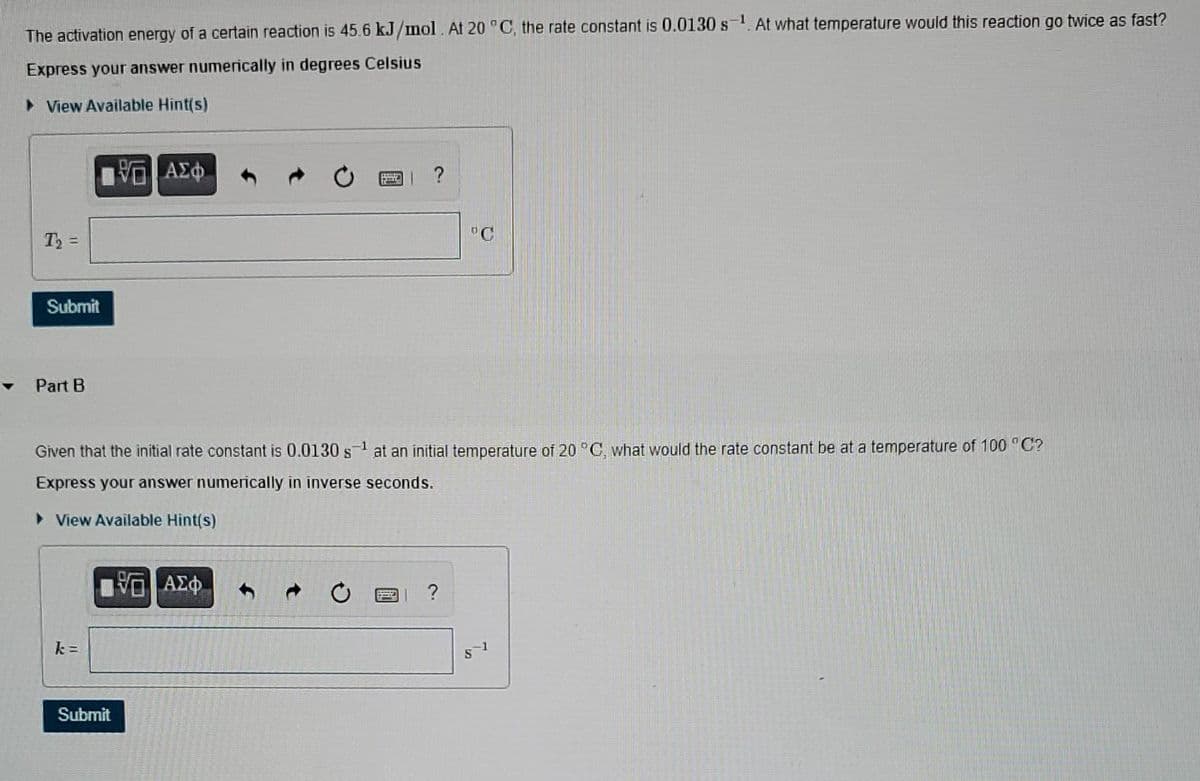The activation energy of a certain reaction is 45.6 kJ/mol. At 20 °C, the rate constant is 0.0130 s. At what temperature would this reaction go twice as last? Express your answer numerically in degrees Celsius > View Available Hint(s) 阳 AE中 T2 = "C Submit Part B Given that the initial rate constant is 0.0130 s at an initial temperature of 20 °C, what would the rate constant be at a temperature of 100 °C? Express your answer numerically in inverse seconds. > View Available Hint(s) 1响AX中 k = s1 Submit
The activation energy of a certain reaction is 45.6 kJ/mol. At 20 °C, the rate constant is 0.0130 s. At what temperature would this reaction go twice as last? Express your answer numerically in degrees Celsius > View Available Hint(s) 阳 AE中 T2 = "C Submit Part B Given that the initial rate constant is 0.0130 s at an initial temperature of 20 °C, what would the rate constant be at a temperature of 100 °C? Express your answer numerically in inverse seconds. > View Available Hint(s) 1响AX中 k = s1 Submit
Chemistry: Principles and Reactions
8th Edition
ISBN:9781305079373
Author:William L. Masterton, Cecile N. Hurley
Publisher:William L. Masterton, Cecile N. Hurley
Chapter11: Rate Of Reaction
Section: Chapter Questions
Problem 38QAP: Consider the first-order decomposition of phosgene at a certain temperature. COCl2(g)productsIt is...
Related questions
Question

Transcribed Image Text:The activation energy of a certain reaction is 45.6 kJ/mol. At 20 °C, the rate constant is 0.0130 s-1. At what temperature would this reaction go twice as fast?
Express your answer numerically in degrees Celsius
> View Available Hint(s)
T =
Submit
Part B
Given that the initial rate constant is 0.0130s1 at an initial temperature of 20 °C. what would the rate constant be at a temperature of 100 "C?
Express your answer numerically in inverse seconds.
> View Available Hint(s)
?
k =
Submit
Expert Solution
This question has been solved!
Explore an expertly crafted, step-by-step solution for a thorough understanding of key concepts.
Step by step
Solved in 4 steps with 3 images

Knowledge Booster
Learn more about
Need a deep-dive on the concept behind this application? Look no further. Learn more about this topic, chemistry and related others by exploring similar questions and additional content below.Recommended textbooks for you

Chemistry: Principles and Reactions
Chemistry
ISBN:
9781305079373
Author:
William L. Masterton, Cecile N. Hurley
Publisher:
Cengage Learning

Chemistry: Principles and Practice
Chemistry
ISBN:
9780534420123
Author:
Daniel L. Reger, Scott R. Goode, David W. Ball, Edward Mercer
Publisher:
Cengage Learning

Chemistry for Engineering Students
Chemistry
ISBN:
9781337398909
Author:
Lawrence S. Brown, Tom Holme
Publisher:
Cengage Learning

Chemistry: Principles and Reactions
Chemistry
ISBN:
9781305079373
Author:
William L. Masterton, Cecile N. Hurley
Publisher:
Cengage Learning

Chemistry: Principles and Practice
Chemistry
ISBN:
9780534420123
Author:
Daniel L. Reger, Scott R. Goode, David W. Ball, Edward Mercer
Publisher:
Cengage Learning

Chemistry for Engineering Students
Chemistry
ISBN:
9781337398909
Author:
Lawrence S. Brown, Tom Holme
Publisher:
Cengage Learning

Chemistry by OpenStax (2015-05-04)
Chemistry
ISBN:
9781938168390
Author:
Klaus Theopold, Richard H Langley, Paul Flowers, William R. Robinson, Mark Blaser
Publisher:
OpenStax

Chemistry: The Molecular Science
Chemistry
ISBN:
9781285199047
Author:
John W. Moore, Conrad L. Stanitski
Publisher:
Cengage Learning

Chemistry
Chemistry
ISBN:
9781305957404
Author:
Steven S. Zumdahl, Susan A. Zumdahl, Donald J. DeCoste
Publisher:
Cengage Learning